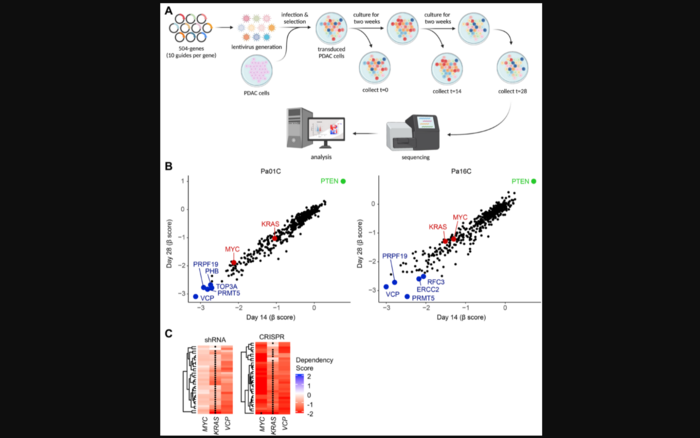“In summary, our goal was to identify additional therapeutic targets for KRAS-driven PDAC.”

Credit: 2023 Lee et al.
“In summary, our goal was to identify additional therapeutic targets for KRAS-driven PDAC.”
BUFFALO, NY- March 24, 2023 – A new research paper was published in Genes & Cancer on March 10, 2023, entitled, “VCP/p97, a pleiotropic protein regulator of the DNA damage response and proteostasis, is a potential therapeutic target in KRAS-mutant pancreatic cancer.”
Researchers have recently shown that proteins involved in the DNA damage response (DDR) are critical for KRAS-mutant pancreatic ductal adenocarcinoma (PDAC) cell growth in vitro. However, the CRISPR-Cas9 library that enabled the identification of these key proteins contained limited representation of DDR-related genes. In their recent study, researchers Ye S. Lee, Jennifer E. Klomp, Clint A. Stalnecker, Craig M. Goodwin, Yanzhe Gao, Gaith N. Droby, Cyrus Vaziri, Kirsten L. Bryant, Channing J. Der, and Adrienne D. Cox from the University of North Carolina at Chapel Hill performed a comprehensive, DDR-focused CRISPR-Cas9 loss-of-function screen to further investigate the DDR in this context.
“Our search was directed toward DDR proteins, stemming from our previous identification of this pathway as an important mechanism for PDAC survival [28].”
This screen identified valosin-containing protein (VCP) as an essential gene in KRAS-mutant PDAC cell lines. The team observed that genetic and pharmacologic inhibition of VCP limited cell growth and induced apoptotic death. To address the basis for VCP-dependent growth, they first evaluated the contribution of VCP to the DDR and found that loss of VCP resulted in accumulation of DNA double-strand breaks.
Next, they addressed its role in proteostasis and found that loss of VCP caused accumulation of polyubiquitinated proteins. The researchers also found that loss of VCP increased autophagy. Therefore, the team reasoned that inhibiting both VCP and autophagy could be an effective combination. Accordingly, they found that VCP inhibition synergized with the autophagy inhibitor chloroquine. Their conclusion was that concurrent targeting of autophagy can enhance the efficacy of VCP inhibitors in KRAS-mutant PDAC.
“We identified VCP as an important protein for PDAC growth and proteostasis via its regulation of protein degradation. VCP has therapeutic potential; however, explorations of this potential in preclinical studies were limited to the use of VCPi CB-5083.”
Read more: DOI: https://doi.org/10.18632/genesandcancer.231
Correspondence: Adrienne D. Cox – Email: [email protected]
Keywords: autophagy, DNA damage response, KRAS, pancreatic cancer, VCP
About Genes & Cancer: Genes & Cancer covers all aspects of the structure and function of oncogenes, growth suppressor and apoptotic genes, their role in signal transduction and the mechanisms by which their expression and function are altered during tumor development. In addition to publishing manuscripts that directly relate to these areas of research, Genes & Cancer also aims to attract papers in the areas of genomics, drug development and systems biology.
To learn more about Genes & Cancer, visit www.genesandcancer.com and connect with us on social media:
- YouTube
For media inquiries, please contact: [email protected].
Genes & Cancer Journal Office
6666 East Quaker Str., Suite 1C
Orchard Park, NY 14127
Phone: 1-212-659-5400
###
Journal
Genes & Cancer
DOI
10.18632/genesandcancer.231
Method of Research
Observational study
Subject of Research
Cells
Article Title
VCP/p97, a pleiotropic protein regulator of the DNA damage response and proteostasis, is a potential therapeutic target in KRAS-mutant pancreatic cancer
Article Publication Date
10-Mar-2023



